|
Alpha Omega Labs:
Truth about the dangers of surgical
intervention in cancer treatment in general,
and biopsies in particular
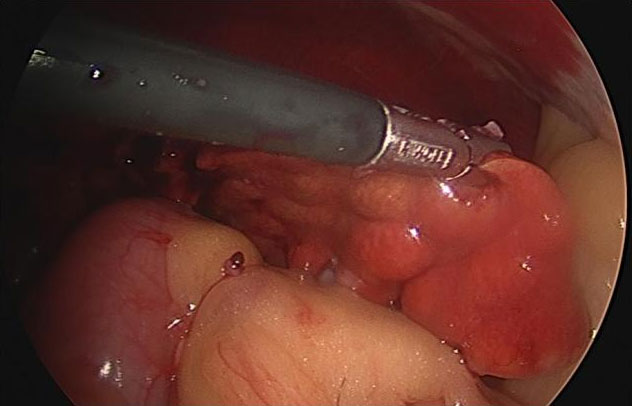

We frequently hear from customers who seem surprised to find
that following a surgical procedure to remove their cancer, or even
undergo something that is seemingly innocuous as a biopsy, that something
far worse results:
 The cancer returns, far more aggressively
and pervasive than it was before . . .
 A cancer results where it was doubtful there
was any cancer to begin with . . .
 What was a Stage I cancer has now blossomed
into a fast-growing Stage IV growth that needs immediate attention . . . etc., etc.
 Upon hearing this, we often tell our customer
that physicians have known for hundreds of years that cutting into cancers only
causes them to spread and become an even more threatening medical condition. (1)
How could this possibly be? After all, don't medical doctors take a Hippocratic
Oath to do what is in the best interest of the patient, a promise to "do thee no harm"? . . .
It's a formality, of course . . .
but the question is, does it have any bearing on practice . . . like . . . well . . .
when politicians take an oath of office to do what is in the best interests of
their constituents, when they clearly more often do the exact opposite of
what they promise? The evidence clearly suggest, "No."
 I wrote an essay last summer,
which -- among other things -- made the point that there is no evidence that conventional
treatments, be they chemotherapy, radiation, or radical surgery, are any better for the
patient than alternative therapies. (2) But this only encapsulated my latest thinking,
since I've been mentally compiling the evidence since about the time I was
taking pre-med courses in the mid-70s.
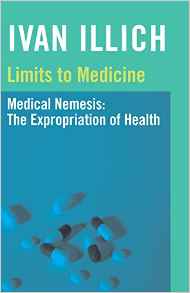
 Sometime in 1975, I happened to
read Ivan Illich's Limits to Medicine / Medical Nemesis: The Expropriation of Health.
The book's preface contains the best summation of the author's main point:
"The medical establishment has become a major threat to health . . . (and)
the layman and not the physician has the potential perspective and effective
power to stop the current iatrogenic epidemic." (3) I would argue that this
statement is truer today than when it was written more than 40 years ago,
and in few areas does it more clearly manifest itself in the ill-effects
of unnecessary surgeries -- misrepresented to patients as to its true
effects, driven more by financial motivation than by medical necessity,
and purely evil in the way it is touted as more beneficial than
less expensive alternative methods with better track records.
 The indictment against surgery, particularly
as its relates to use in cancer diagnosis and treatment, is long standing and
has its roots in published works going back almost 200 years -- hundreds of
years after modern surgery, as we know it, was "invented by gunpowder; when bows
and arrows were superseded by powder and shot in the fifteenth century, the
human damage it wreaked caused major advances in surgical technique." (4)
 It seems that surgery had its roots in
war, and it has never strayed far from its initial mooring.

 Among the earliest records I have found indicating
that medical practitioners were well aware that surgical intervention in cancer treatment
normally leads to disastrous results is Thomas Battye's Cancer Extirpated Without the
Knife, published in 1837. Battye's states the observation of the time in clear and
unmistakeable terms: "The immediate reproduction of the malady (cancer) in its original
seat is a common consequence of operations by the knife, and arises from the general impossibility
of removing the finer and deeper seated ramifications by this means: it is, in fact, the result
of imperfect extirpation, there remaining a germ, as it were, from which the cancerous
growth sprouts out afresh." (5) Or . . . to restated in more current terminology:
surgery causes cancer to become metastatic.
 As if Dr. Battye didn't make himself clear enough,
he goes on to state: "It is not the eye alone which fails us in tracing the fine and
manifold ramifications of its polypous growth; the instrument and the hand of the operator
are equally baffled, for neither is sufficiently delicate to trace and eradicate these
thread-like offshoots. Nay more, could these difficulties be surmounted by the surgeon,
and his manual art add another triumph to the still increasing list of conquests over
nature, there would yet remain an insuperable obstacle in the irritation of the adjoining
parts, consequent on the employment of the knife. I entertain no doubt, indeed, that this is
sometimes the only, as it is always a concomitant cause of the reappearance of cancerous
disease after an operation. It is also observable in cases of failure, that the patient is
reduced to an infinitely worse state than that in which he previously found himself.
From the violent shock which nature receives, particularly in the case of delicate females;
and from the injury inflicted by the knife on the surrounding tissues, and the irritation
of the parts that hence ensues, the morbid poison acquires new virulence; the fibrous particles
of the cancerous formation, which are so often residuous, propagate themselves with
inconceivable rapidity; the disease quickly extends to a distance it would have been long in
reaching, if left undisturbed by the mischievous interferernce of the knife; and,
reproduced under an aggravated form, it becomes more difficult to treat." (6)
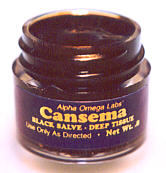
 What does Dr. Battye recommend in place of
surgical intervention in the treatment of cancer? He is less clear on this point.
"To come to my own practice. I have stated that I am not warranted in disclosing
the ingredients composing the formula which I have found such powerful instruments
for the cure of Cancer." But it doesn't matter. Upon careful study of the
case studies with which Dr. Battye closes his book, one can clearly see that he is
using a forerunner of Cansema. (7)
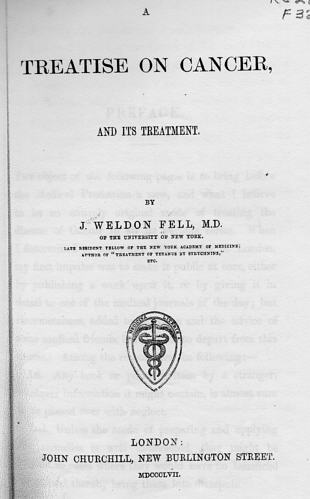
 If Dr. Battye was not entirely forthcoming in
revealing his secrets, J. Weldon Fell (M.D.) had no problem spilling the beans,
but not before revealing that surgerical interference in cancer was known to be
a dangerous pursuit going all the way back to Hippocrates: "Cancerous tumours may
be removed by the knife, but in doing this the morbid growth alone is removed,
and, as we shall find, the tendency for the reproduction of the disease either
in the cicatrix or elsewhere is excited, and soon after most operations the sufferer
is in worse position than before. At the present time few surgeons recommend
ablation by the knife, although for years it seems to have been a disputed point
whether operations were justifiable or no. Hippocrates taught 'that occult cancers
should not be interfered with, because experience has shown that persons submitted
to treatment had perished more rapidly than those who had not been thus meddled with.' " (8)
 Fell then goes on to note nearly ubiquitous
agreement among the ancients as to the ill-advised position that cancers should
be removed surgically, finally quoting from Monro, that "finding that of nearly sixty
persons who had submitted (to me) to the excision of cancer, four only remained free
of relapse at the end of two years, and that, in those in whom the disease returned,
it made more rapid progress than it commonly did in others, became a staunch
opponent of surgical interference." (9)
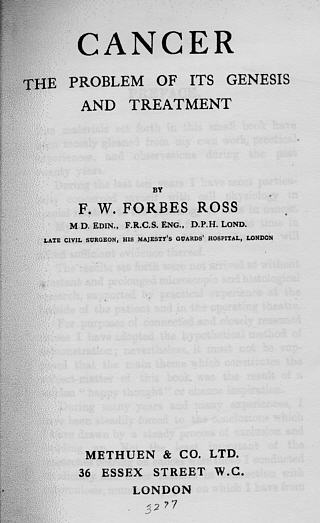
 A few years later, in 1866, John Pattison provided
further corroborating evidence as to the effects of surgery in the treatment of cancer
with his monograph, Cancer: It's Nature, and Successful and Comparatively Painless
Treatment, which I cover in Chapter 2 of Meditopia.
This was followed by in 1912 by a work by F.W. Forbes Ross, M.D., entitled
Cancer: The Problem of its Genesis and Treatment, which opens with a blistering
attack on surgical procedures as a method of treating cancer, after 20 years of
practice as a "civil surgeon" and observation of the general practice,
and then segways into his hypothesis -- namely, that
"cancer is due to a want of balance in particular mineral salts in the body." (10)
 On the very heels of Dr. Ross's work was the
publication of Dr. Robert Bell's, Cancer: Its Cause & Treatment Without Operation,
which -- by its very unambiguous title -- tells the reader that the author's entire
thrust is the circumvention of surgery as a means of treating cancer because of its
dismal track record. What I found interesting in the case of Bell's book was his
enthusiast acknowledgement of the support of "Medical Times, Lancet, British Medical Journal . . ."
etc. This indicated to me that medical journals of that time, unlike today, were not so
thoroughly corrupt
as to their reporting of the medical record. Truth still had meaning. (11)
 Another interesting work of the period is
Cancer and Its Non-Surgical Treatment by L. Duncan Bulkley, M.D., which deals
with surgery's failures tangentially in the book's closing chapter on statistical outcomes.
One can see with Bulkley's book, the first glimpse of medical tyranny where physicians
felt they had to be delicate in addressing procedures that were highly profitable
to the profession.
 This is evident in the language of Cancer & Common Sense,
written by George Crile, Jr., M.D. in 1955. (12) Unlike works of the 1800's and even early 1900's,
one can sense extreme care in approaching the subject. Still, in a reading between the lines,
the message is clear: be extremely cautious in making any decision to go under
the knife in connection with cancer.
 This page does not purport to give the reader anything
close to a comprehensive bibliographical listing of the works by members of the medical community
who have been critical of treating or diagnosing cancer using surgical intervention.
Instead, it is intended to convey that the advice to AVOID surgery extends into antiquity,
to the writings of Hippocrates and beyond.
 Speaking more personally, since Cathryn and I began working
in this area in 1990, we have received reports from untold hundreds, if not thousands of people,
who deeply regreted electing for surgery in connection with their cancer. This is not to say
that there have not been some successful outcomes. There have even been a few cases where we
ourselves recommended surgery as a course of action. But, again, these have been rare.
 As naturopaths, we consider surgery as something
that is done as a last resort, when all other approaches have proven unsuccessful.
This even applies to biopsies.
Time and experience have taught us to view surgery as something that should be approached
with the upmost gravity. It is the only sensible way to approach it.
 Greg Caton
Greg Caton
Medical Researcher
Alpha Omega Labs
Cuenca, Ecuador
March 11, 2016
Footnotes
- See Chapters 1 and 2 of Meditopia.
- This point is further accentuated if you read the links within the article -- again:
http://www.altcancer.net/ashwin/ashw0615.htm.
- A later copy of this book is quoted here. Limits to Medicine / Medical Nemesis: The Expropriation of Health, Ivan Illich,
Marion Boyars, New York. 2002. Preface, p. v. ISBN: 0-7145-2993-1.
- The Alarming History of Medicine, Richard Gordon, St. Martin's Press, New York. 1993, "The Demon Barbers," p. 121, 125.
ISBN: 0-312-10411-1.
- Cancer Extirpated Without the Knife (1837), Thomas Battye, Kessinger Legacy Reprints, p. 19-20. ISBN: 9781166435653.
- Ibid., 77-79.
- Ibid. p. 79.
- Treatise on Cancer and its Treatment, J. Weldon Fell, M.D., 1857, John Churchill, New Burlington Street, London. p. 44.
I do not go into detail here on Fell's formula or practices, as this I cover this in detail in
Chapter 2 of Meditopia. Incidentally, the quote attributed
to Hippocrates, the "Father of Medicine," comes from
The Aphorisms of Hippocrates (from the Latin version of Verhoofd),
#38 -- or from the previous iteration in Latin:
"Quibus occulti cancri fiunt, eos noixcurare melius est. Curati enim cito pareunt non curati vero longius tempus perdurant."
- Fell is quoting from Mayo's Outlines of Pathology, p. 573.
- Cancer: The Problem of its Genesis and Treatment, F.W. Forbes Ross, Methuen & Co., Ltd, London, England, 1912. p. 8.
- Cancer: Its Cause and Treatment Without Operation, Robert Bell, M.D., G. Bell & Sons, Ltd., 1913, p. vii-viii.
- Cancer & Common Sense, George Crile, Jr., M.D., The Viking Press, 1955. LOC number: 55-12187.
|
"According to the elder Monro, out of sixty patients operated upon, there remained only four
who, at the expiration of two years, had not suffered a relapse. The justly eminent Scarpa
states that in the course of his long experience and extensive practice, only three cases had
occurred in which the extirpation of true schirrus had not been followed by a reproduction
of the disease. The result of M. Boyer's practice gives five cures out of a hundred individuals
in whose cases he had employed the knife; in all the rest, the disease returned, and death followed.
And I entertain no doubt, that were every surgeon conversant with cancerous complaints, and prone
to recur to the knife, to publish the list of his successes and failures, the balance would be
similarly unfavourable.
Many reasons can be assigned for the fatality attendant on this cruel, and all but hopeless operation.
The well-known and distinguishing characteristic of the disease is to propagate itself by contamination
of the adjoining parts, and yet to afford no signs by which this process of contamination has reached.
Thus the whole diseased locality, as far as it can be recognized by the sign, may be removed; the wound
healed; and the patient, to all appearance, in a fair way of recovery; still, the surrounding parts,
which when laid open by the operation to inspection and to touch, had exhibited every ocular and palpable
sign of healthy structure, may be infected with the virus, and assume, in their turn, all malignancy of the disease . . ."
Thomas Battye, M.D.
Cancer Extirpated
Without the Knife (1837)
p. 72-73
"Much suffering has been man-made. The history of man is one long catalogue
of enslavement and exploitation, usually told in the epics of conquerors or sung in the elegies of their victims.
War is at the heart of this tale, war and the pillage, famine, and pestilence that came in its wake.
But it was not until modern times that the unwanted physical, social, and psychological side-effects
of so-called peaceful enterprises began to compete with war in destructive power."
Ivan Illich
Limits to Medicine (1975)
p. 261 (3)
"Doctors have always tended by overestimate the effectiveness of their intervention and to
underestimate the risks . . . Indeed, the history of treatment of illness . . . suggests
that Francis Galton was generous in his conclusion that there is a considerable difference
between a good doctor and a bad one, but hardly any difference between a good doctor and
none at all."
Thomas McKeown, M.D.
The Role of Medicine (1979)
p. 177 (4)
" ' You surgeons may say what you like about the thoroughness with which you claim to excise
with your knife a cancerous growth, and no doubt in many cases you are successful, especially when
you deal with an early case of cancer, in that in a very few cases the disease after operation does not recur.
On the other hand, the cases in which recurrence supervenes after operation are quite sufficiently
numerous to give pause to any insistent claim as to the curability of cancer by what we know,
and by what can be done at the present moment . . . "
F.W. Forbes Ross, M.D.
Cancer: The Problem of
Its Genesis and Treatment (1912)
( Told to the author by a
"former Pathologist of a
large general hospital
in London." ) p. 1-2.
" The main thing about the treatment of cancer is not how early it is treated, not how radically it is
treated, but how wisely it is treated. There is plenty of time. A week or a month will probably
make no difference in the outcome. Do not panic. Be sure that the diagnosis is definite. Recheck it if
it is not. Diagnostic tests are not very satisfactory for cancers of the pancreas, liver, and upper
part of the stomach. All of these cancers about which little can be done to effect a cure, regardless
of how early they are diagnosed . . . Operations performed to make a diagnosis are sometimes
necessary but are not likely to find cancers that can be cured . . .
Do not be afraid to ask your surgeon to tell you the truth. If you do not ask him, he may evade the issue.
He may mention a tumor, an obstruction, a dozen other vague and meaningless words. But this problem is
your problem. You have the right to know, to have the opinion of another doctor if you wish. It is your
right to know where the trouble is, what it is, and what has to be done to get rid of it. This is a major
issue in your life. You should have as much information as possible before you decide. If the picture is not
clear you should take time for thought. A few days of delay will do no harm.
There is another category of operations -- the totally unnecessary operations that are done in the absence
of disease and not even with a legitimate excuse of preventing it. These operations are performed
by surgeons who exploit the fear of cancer. . . . Each increase in the fear of cancer makes normal
people more susceptible to the veiled implications of the unethical surgeon . . . The real disease is
cancer phobia, deeply rooted in the minds of the people who accept unnecessary options. It is fear that causes
people to demand treatments that are not of use."
George Crile, Jr., M.D.
Cancer & Common Sense (1955)
p. 65-66
|






